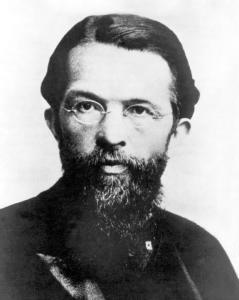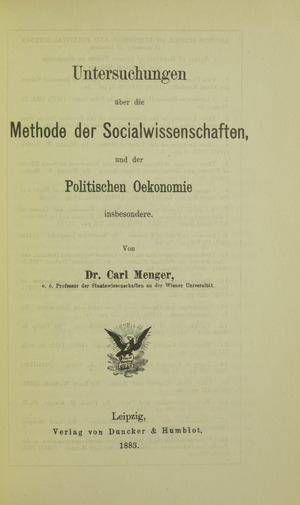Carl Menger facts for kids
Quick facts for kids
Carl Menger von Wolfensgrün
|
|
|---|---|

Carl Menger von Wolfensgrün, founder of the Austrian School
|
|
| Born | 28 February 1840 |
| Died | 26 February 1921 (aged 80) |
| Nationality | Austrian |
| Field | Economics |
| School or tradition |
Austrian School |
| Alma mater | University of Prague University of Vienna Jagiellonian University |
| Other notable students | Prince Rudolf |
| Influences | |
| Contributions | Marginal utility, Subjective theory of value |
Carl Menger von Wolfensgrün (born February 28, 1840 – died February 26, 1921) was an important Austrian economist. He is known for starting the Austrian School of economics. Menger helped create ideas like marginalism and marginal utility. These ideas changed how people thought about value. Before Menger, many economists believed value came from the cost of making something. Menger, however, said that value is more about what people think something is worth. He called this the subjective theory of value.
Contents
Biography
Family and Education
Carl Menger was born in a city called Neu-Sandez. This city was in a region called Galicia, which was part of the Austrian Empire. Today, it is known as Nowy Sącz in Poland. His family was well-off, and his father, Anton Menger, was a lawyer. Carl had two brothers, Anton and Max, who also became famous lawyers. His son, Karl Menger, grew up to be a mathematician.
Carl went to a gymnasium, which is a type of high school. After that, he studied law at the Universities of Prague and Vienna. He earned his doctorate degree from the Jagiellonian University in Kraków. In the 1860s, Menger worked as a journalist. He reported on and analyzed market news for newspapers in Lemberg (now Lviv, Ukraine) and Vienna.
Career
While working as a journalist, Menger noticed something interesting. What he learned about how prices are set in school didn't quite match what he saw in real markets. This made him curious. In 1867, he started studying economics deeply. This led to his famous book, Principles of Economics, published in 1871. This book made him known as the founder of the Austrian School of economic thought. In his book, he argued that the value of something is not just about how much it cost to make. Instead, he said that value is determined by how much extra satisfaction or use a person gets from one more unit of something. This is called marginality.
In 1872, Menger became a teacher at the University of Vienna. He taught about money and economics to many students. In 1873, when he was only 33, he became a full professor of economic theory at the university.
From 1876, Menger became a tutor to Crown Prince Rudolf of Austria, who was the son of the Emperor of Austria. For two years, Menger traveled with the prince across Europe and the British Isles. He taught the prince about economics and statistics.
In 1878, Emperor Franz Joseph I of Austria appointed Menger to a top position in economics at Vienna. He was also given the special title of Hofrat. In 1900, he became a member of the Austrian Herrenhaus , which was like a house of lords.
Debate with Other Economists
As a professor, Menger worked to improve and defend his ideas from Principles of Economics. This led to another book in 1883, called Investigations into the Method of the Social Sciences with Special Reference to Economics. This book caused a big debate among economists. Some German economists, who followed a different way of thinking called the historical school, started to call Menger and his students the "Austrian School." They used this name to show that Menger's ideas were different from their own.
In 1884, Menger wrote a pamphlet called The Errors of Historicism in German Economics. This started a famous debate known as the Methodenstreit , or "methodological debate." It was a disagreement about the best way to study economics. During this time, Menger attracted students who agreed with his ideas. Two of his most famous students were Eugen von Böhm-Bawerk and Friedrich von Wieser.
In the late 1880s, Menger was chosen to lead a group that would improve Austria's money system. Over the next ten years, he wrote many articles that changed how people thought about money. These included "The Theory of Capital" (1888) and "Money" (1892). Menger retired from his professorship in 1903 to focus more on his studies.
Economics
Menger's subjective theory of value led to a very important idea in economics: that both sides gain from exchange. This means that when two people trade something, they both feel better off afterwards. Menger also explained how money came to be. His ideas on money are still accepted by some economists today.
Money
Menger believed that gold and silver became popular as money because they had special qualities. They were valuable, lasted a long time, and were easy to keep safe. This made them good for saving and trading. Menger showed that these metals were easy to buy and sell, more so than other goods. This made them useful as a general way to exchange things, which led to them becoming money in many societies.
Works
- 1871 – Principles of Economics
- 1883 – Investigations into the Method of the Social Sciences with Special Reference to Economics
- 1884 – The Errors of Historicism in German Economics
- 1888 – The Theory of Capital
- 1892 – On the Origins of Money
See also
 In Spanish: Carl Menger para niños
In Spanish: Carl Menger para niños
- Methodenstreit
- History of macroeconomic thought
- Historical school of economics
 | Sharif Bey |
 | Hale Woodruff |
 | Richmond Barthé |
 | Purvis Young |


